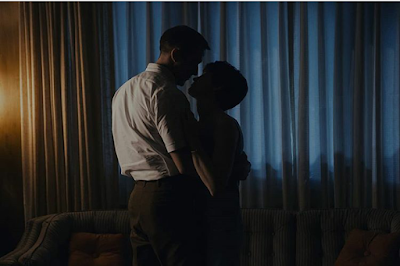First Man
First Man - A Ballad for the Achievements of the Regular Man
Growing up, the name of Neil Armstrong had always been enveloped in mysticism. In my imagination, and probably in the imagination of most of us, he wasn't a regular human being - he was on the ranks of epic heroes and demi-gods like Ulysses or Hercules. "The first man to walk on the moon" - how could he have been human? How could a man have done such a feat? He surely must have been a superior being - a god walking amongst men. But he was a human being. Demi-gods and epic heroes did not walk on the Moon - regular men did. Men with traumas and who suffered terrible losses- Men who worked hard for the advancement of humanity and its horizons. Mere mortals. Real heroes. Neil Armstrong was a human being like all of us and we tend to forget this fact about historical figures. And Damien Chazelle did a perfect job in this film that is more a ballad for the achievements of mankind and the regular men and women behind them.
This film is not about the Apollo 11 mission. This film is not about heroism. This film is not about nationalism. This film is about a man, Neil Armstrong - who is played by Ryan Gosling, in one of his best performances so far, playing this historical figure with such nuance, bringing a whole new level to the character of Neil. We follow not only Neil's mission to participate in mankind's quest to go to the moon but also his personal and psychological life. We peer into the soul of this man that we idolatrize and thought we knew, who was as fragile, broken and full of insecurities just like all of us. He was a regular man, and we are constantly reminded of that fact throughout the film - a man who suffered trauma and loss.
We also follow his family life and his relationship with his wife, Janet Armstrong - played incredibly by Claire Foy, with one of the strongest performances of the year. It's so fascinating how Chazelle intersects Neil's "out of this world" missions and Neil's "earth-bound" family life. It's particularly touching the emphasis he gives to Janet's role in Neil's life. She has to suffer through the crushing possibilities that she may not see her husband ever again, that the next day she may have to bury him or lose him forever to the cold darkness of space. She has to stand up to him, impose herself and force Neil to talk with his kids and tell them that he may not ever be coming back. They say that behind every great man there is a great woman. That is most certainly true in this case. She may not have gone into space, but she fought a battle of her own and, without her, Neil could never have done what he did - and for that she deserves to be seen as much a hero as him.
An important thing to note is the musicality of this film. Chazelle's previous films (Whiplash and La La Land) were centered on music, but First Man is no less musical than the others. With one of the most brilliant musical scores of the year that elevates every scene to a whole new emotional level. It ranges from extraordinary moments that will give you goosebumps - like the chilling, military-like score in the Moon landing scene - to moments that will bring tears to your eyes - like the moving score of Neil's walk on the surface of the Moon.
And then there's Gosling's eyes, the element in the film that gives body to Neil's soul. Ryan Gosling proves (once again) in this film that he is one of the greatest actors in the history of cinema. He has more acting chops in his eyes than most actors have in their whole bodies. And Chazelle brilliantly uses this talent to elevate his masterpiece. There are constant close-ups of Gosling's eyes, and, through them, you see the soul of a man going through the most unique and the most extraordinary experience that any man or woman had ever lived. Through his eyes, you see the immensity of space and the change of perspective inside the mind of Neil Armstrong. Through his eyes you see him being overwhelmed by the humbling feeling of contemplation of something so great that our brains could never even ambition to process. Through his eyes, we see his realization that our planet is nothing more than a small spec in the enormous greatness of our Universe. And for that, Ryan Gosling deserves every award in the upcoming award season.
This film is a surprisingly moving experience. With out-of-this-world cinematography, incredibly creative camera work, beautiful soundtrack, and Gosling's amazing performance, this is an unforgettable and overwhelming experience. When Neil Armstrong is walking on the Moon, looking at the immense grey desert of the lunar surface, it is impossible not to have tears welling in your eyes. A man that has gone through emotional traumas, who has lost a daughter and friends in tragic and heartbreaking deaths, a man who has gone through hell, has walked on the moon! A regular human being from a middle-class family with no prestigious background has achieved that! And if he was able to do something like that, then we all can do anything! It is impossible not to be filled with pride in this scene. Not nationalistic pride - something that goes beyond that, something on the realm of human pride, because this wasn't just an American achievement, this was an achievement of humanity as a whole. And then, as if we weren't emotional enough, we see, in a brilliantly edited scene, his life on Earth - how simple it was, how insignificant all the good and bad times, all the suffering, all the bliss, all the battles, all the passions. But is it all really insignificant? This is one of the most intense scenes of the past few years and, by the end of it, it's impossible not to have tears of so many feelings mixed together welling in your eyes.
It is important to point out that this mission isn't without its costs and injustices. It is referenced all throughout the film that this project was funded by American taxpayers, many of whom struggled to bring food to the table and faced inhuman injustices in their lives. We can't forget that this is set in the 60's and that this was a decade of conflicts and clashes. We are invited to question: At what cost was this mission successful? What did we gain from it? Could the money spent on this mission have been spent for something possibly more useful to society? What did this achievement mean to humanity?
The answer may lie in the last scene. After the successful return to Earth, Neil and his colleagues are put into quarantine for security reasons. Janet comes to visit him. They sit in a room alone, reunited yet separated, not only by the glass between them but also by the different experiences they had - he had the unique experience of going to the Moon and she had the unique experience of waiting for her husband who went to the moon - and the different perspectives each one has of life on Earth.
In this moving scene lies the answer to the previous questions. It was important, not only because of the technological advancements and possibilities brought to humanity by it, but also the change in the perspective of our small planet and our smaller selves. We may not have experienced what these men experienced, but their feat did change humanity forever. It changed the way we look at the world. It made us realize that we don't need to be supermen or superwomen to achieve great things. We just need to be humans, because we are a species that can do incredible things - and the sky isn't the limit! And that was worth every penny spent in space exploration. Let's just hope that this change wasn't all in vain.




Comments
Post a Comment